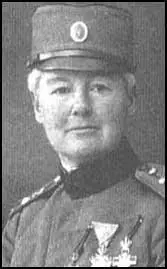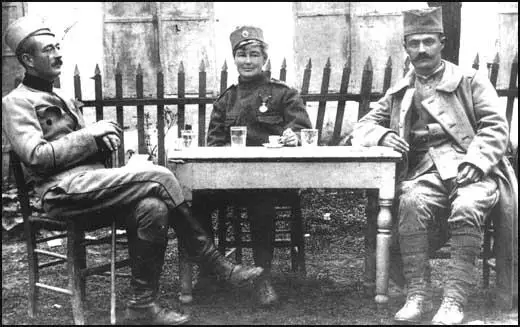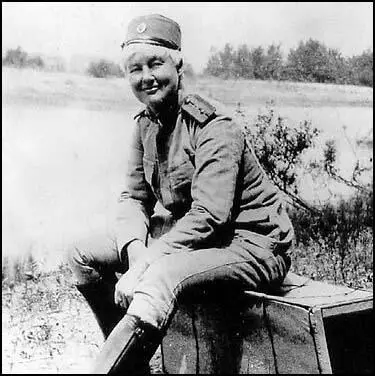Flora Sandes

Flora Sandes, the daughter of Samuel Sandes, a Scottish clergyman, was born on 22nd January, 1876. On the outbreak of the First World War, Sandes joined an ambulance unit in Serbia on the Eastern Front.
In November, 1915, the Serbian Army was unable to stop Austro-German and Bulgarian forces advancing deep into Serbia. Sandes joined the army when it retreated into Kosovo and by the end of November, the forces had reached the Albanian mountains.
Ishobel Ross of the Scottish Women's Hospital Unit recorded in her diary that she met Flora Sandes in 1916. "Colonel Vassovitch came into the camp with an English woman dressed in the uniform of the Serbian Army. Her name is Flora Sandes. She is quite tall with brown eyes and a strong, yet pretty face. She is a sergeant in the 4th Company and talked to us for a long time about her experiences, and the fierce fighting she and the men of her company had to face. We felt so proud of her and her bravery."
Although nearly forty years old, in December 1916, was promoted to the rank of sergeant-major. In an effort to raise funds for the Serbian forces, Sandes wrote and published, An English Woman Sergeant in the Serbian Army (1916).
After the war, Sandes remained in the Serbian Army and had reached the rank of major by the time she retired. In 1927 Sandes married the former White Army general, Yurie Yudenich. After her husband's death in September, 1941, Sandes returned to England.
Flora Sandes died at her Suffolk home on 24th November, 1956.


Primary Sources
(1) In November, 1915, Sergeant Flora Sandes reached the Albanian mountains.
The Fourth Company were holding some natural trenches a short way further on, and we were not allowed to go any further. The Bulgarians seemed to have got their artillery fairly close, and the shrapnel was bursting pretty thickly all around. We sat under the shelter of the wall and watched it, though, as it was the only building standing up all by itself. it seemed to make a pretty good mark, supposing they discovered we were there, which they did very shortly.
The shells were beginning to fall pretty thickly in our neighbourhood, and our Battalion Commander finally said it was time to move on. He proved to be right, as three minutes after we left it the wall under which we were sitting was blown to atoms by a shell.
Later on the next day the sun put in an appearance, as did also the Bulgarians. The other side of the mountain was very steep, and our position dominated a flat wooded sort of plateau below, where the enemy were. One of our sentries, who was posted behind a rock, reported the first sight of them, and I went up to see where they were, with two of the officers. I could not see them plainly at first, but they could evidently see our three heads very plainly.
The companies were quickly posted in their various positions, and made my way over to the Fourth which was in the first line; we did not need any trenches as there were heaps of rocks for cover, and we laid behind them firing by volley. I had only a revolver and no rifle of my own at that time, but one of my comrades was quite satisfied to lend me his and curl himself up and smoke.
We all talked in whispers, as if we were stalking rabbits, though I could not see it mattered much if the Bulgarians did hear us, as they knew exactly where we were, as the bullets that came singing round one's head directly one stood up proved, but they did not seem awfully good shots.
(2) Flora Sandes, An English Woman Sergeant in the Serbian Army (1916)
Our Company Commander was a hustler, very proud of his men, and they were devoted to him and would do anything for him, and well they might. He was a martinet for discipline, but the comfort of his men was always his first consideration; they came to him for everything, and he would have given anyone the coat off his back if they had wanted it. A good commander makes a good company, and he could make a dead man get up and follow him.
(3) Flora Sandes, An English Woman Sergeant in the Serbian Army (1916)
That evening was very different to the previous one. Lieutenant Jovitch had a roaring fire of pine logs built in a little hollow, just below what had been our firing line, and he and I and the other two officers of the company sat round it and had our supper of bread and beans, and after that we spread our blankets on spruce boughs round the fire and rolled up in them. It was a most glorious moonlight night, with the ground covered with white frost, and it looked perfectly lovely with all the camp fires twinkling every few yards over the hillside among the pine trees. I lay on my back looking up at the stars, and, when one of them asked me what I was thinking about, I told him that when I was old and decrepit and done for, and had to stay in a house and not go about any more, I should remember my first night with the Fourth Company on the top of Mount Chukus.
(4) Ishobel Ross of the Scottish Women's Hospital Unit recorded in her diary that she met Flora Sandes on 29th September, 1916.
Colonel Vassovitch came into the camp with an English woman dressed in the uniform of the Serbian Army. Her name is Flora Sandes. She is quite tall with brown eyes and a strong, yet pretty face. She is a sergeant in the 4th Company and talked to us for a long time about her experiences, and the fierce fighting she and the men of her company had to face. We felt so proud of her and her bravery.

